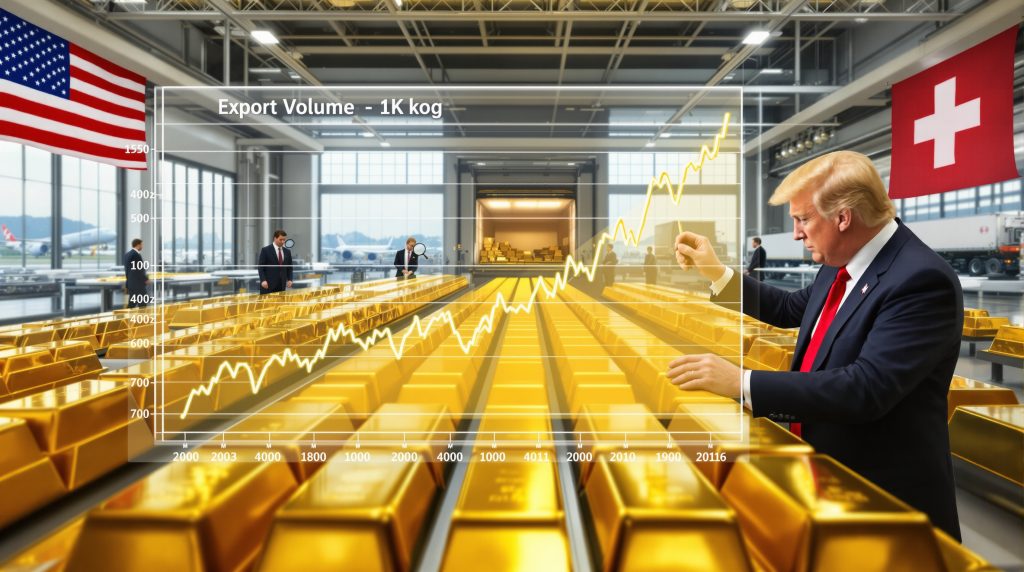Switzerland's Gold Export Surge: Understanding the US Trade Implications
Switzerland's role as the world's premier gold refining hub has placed it at the center of international trade tensions. Recent developments in gold exports between Switzerland and the United States reveal complex market dynamics that extend beyond simple trade statistics, highlighting the intricate relationship between global commodity markets and international trade policy.
The Dramatic Shift in Swiss Gold Exports to the US
Record July Shipments Reveal Market Volatility
Swiss gold exports to the United States surged dramatically to nearly 51 tons in July 2025, representing an extraordinary increase from the previous month's minimal 0.3 tons. This remarkable fluctuation follows an even more substantial peak in January 2025, when Switzerland shipped an exceptional 193 tons of gold to American shores.
These volatile trading patterns underscore Switzerland's pivotal position in the global gold market, serving as the critical connection between mining operations in South America and Africa and the financial centers in London and New York. The dramatic swings in export volumes also reflect the market's sensitivity to gold price analysis and international trade dynamics.
Trade Tensions and Tariff Concerns
The substantial increase in gold shipments has coincided with heightened trade tensions between the two nations. President Trump's administration recently imposed a 39% tariff on Swiss imports, creating significant uncertainty for Switzerland's gold refiners who occupy a crucial position in the international precious metals supply chain.
This policy decision is particularly consequential because Switzerland's refiners, despite handling enormous volumes of gold, capture only a small portion of the trade's total value. Their specialized services focus on transforming raw gold into market-ready products rather than retaining ownership of the metal itself.
"The recent tariff situation has created unprecedented volatility in the gold market, with refiners facing difficult decisions about shipment timing and processing priorities," noted an industry observer from a major Swiss financial institution.
Gold's Outsized Impact on Swiss-US Trade Relations
Dominating Bilateral Trade Statistics
Gold exports worth over $36 billion constituted more than two-thirds of Switzerland's trade surplus with the United States during the first quarter of 2025. This outsized influence has placed Switzerland's gold industry at the center of trade discussions, especially as the Trump administration intensifies its focus on addressing trade deficits.
The sheer scale of these gold flows has complicated trade negotiations, as traditional metrics of bilateral trade balance become distorted by the precious metal's unique position as both a commodity and a financial asset. Unlike manufactured goods or agricultural products, gold often passes through multiple jurisdictions before reaching its final destination.
The Swiss National Bank's Alternative Perspective
Recognizing the potential for misinterpretation, the Swiss National Bank has formally addressed this issue in a published paper, advocating for excluding gold from trade balance calculations with the US. Their argument centers on how the outsized impact of gold exports distorts the true nature of the economic relationship between the two nations.
This position reflects Switzerland's legitimate concern that its gold refining industry—a specialized service sector rather than a traditional export industry—could become collateral damage in broader trade disputes focused on manufacturing and job creation.
The Strategic Importance of Swiss Gold Refineries
Switzerland's Unique Position in Global Gold Flows
Switzerland has established itself as the world's preeminent gold-refining hub through decades of specialized expertise and strategic positioning. The country processes billions of dollars worth of gold continuously flowing across its borders, connecting mining operations in South America and Africa with financial institutions in London, New York, and beyond.
This central position in the global gold supply chain is built on Switzerland's political neutrality, robust financial system, and unparalleled technical capabilities in precious metals refining. Four of the world's largest gold refineries are located in the southern Swiss canton of Ticino, near the Italian border, where they maintain the highest standards of purity and security.
Specialized Technical Capabilities
Swiss refiners provide a crucial technical service by recasting 400-ounce gold bars (the London standard) into the 1-kilogram or 100-ounce formats required by the US-based Comex exchange. This conversion capability became particularly valuable during recent arbitrage opportunities created by price differentials between European and American markets.
The precision and reliability of Swiss refineries mean that their hallmarks are universally accepted in financial markets, allowing gold to move seamlessly between different trading platforms and investment vehicles. This standardization function, while often overlooked, is essential to the efficiency of the surging gold market.
Market Dynamics Under Tariff Uncertainty
Arbitrage Opportunities and Shifting Trade Patterns
Earlier in 2025, concerns that gold might be included in sweeping import duties created a lucrative arbitrage opportunity between European and American markets. This price differential prompted traders to ship large volumes of gold to the US via Swiss refineries, which recast the metal into US-compatible formats.
When gold subsequently received an exemption from tariffs, this flow reversed as price differentials normalized. US prices fell back in line with the benchmark spot price in London, demonstrating the market's efficiency in responding to policy changes. These shifting patterns illustrate how tariff impact on investments can temporarily create market inefficiencies that traders quickly exploit.
Recent Market Disruptions
A federal ruling in early August 2025 that gold bars would be subject to tariffs briefly caused significant disruption in global bullion markets. The situation stabilized only after President Trump personally clarified that precious metals would remain exempt from US import levies.
This episode demonstrated the market's extreme sensitivity to policy signals regarding gold, with record gold prices and trading volumes reacting dramatically to even temporary regulatory uncertainty. The swift intervention to exempt gold highlights its special status among commodities and its importance to financial markets beyond conventional trade considerations.
International Relations and Gold as a Strategic Asset
Switzerland's Unexpected Vulnerability
The Swiss government had previously expressed confidence that it would avoid heavy duties in US trade negotiations, given the specialized nature of its exports and its traditionally positive relations with the United States. The subsequent imposition of a 39% tariff therefore caused considerable alarm within the country.
This development highlighted the unpredictability of current international trade dynamics and Switzerland's unexpected vulnerability despite its historically neutral stance in international politics. The targeting of Swiss exports represents a significant shift in how trading partners view Switzerland's role in global commerce.
Gold as a Political and Economic Lever
The gold trade has emerged as both an economic indicator and a potential bargaining chip in international relations. The metal's unique status as both a commodity and a financial asset makes it particularly sensitive to geopolitical developments and policy decisions, with ripple effects across global markets.
Gold's market relationship with other financial assets adds another dimension to its importance in trade relations. As governments consider trade policies, the treatment of gold reflects broader strategies regarding financial stability, currency relations, and geopolitical positioning.
Frequently Asked Questions About Switzerland's Gold Exports
Why is Switzerland such an important hub for gold refining?
Switzerland has developed specialized expertise in gold refining over more than a century, with strict quality standards and secure infrastructure. The country's political neutrality, stable regulatory environment, and central European location have made it an ideal processing center for precious metals moving between mining regions and financial markets.
Swiss refineries are known for their ability to produce gold products meeting the exacting standards of both industrial users and financial institutions. Their reputation for discretion and security further enhances their appeal to market participants who value confidentiality in high-value transactions.
How do gold tariffs affect consumer prices in the US?
Tariffs on gold imports could potentially increase costs for US jewelry manufacturers, electronics producers, and investment products. However, the complex nature of gold pricing, which is influenced by global factors beyond simple supply-demand dynamics, means the relationship between import duties and consumer prices isn't straightforward.
The global nature of gold pricing tends to moderate local price impacts, as alternative supply routes can develop to circumvent trade barriers. Nevertheless, persistent tariffs would eventually lead to higher costs for American consumers of gold products, from wedding rings to electronics components.
What alternatives exist to Swiss gold refineries?
While several countries including Australia, Canada, and the United Arab Emirates have developed significant gold refining capabilities, none match Switzerland's combination of capacity, expertise, and trusted reputation. Developing alternative refining hubs with comparable standards would require substantial investment and time.
The UAE has made particular strides in recent years, establishing Dubai as a growing center for gold refining and trading. However, Swiss refineries maintain advantages in terms of established relationships, technical expertise, and the universal acceptance of their quality standards in financial markets.
How might this trade situation evolve in the coming months?
Trade analysts suggest that gold's strategic importance and the interconnected nature of global precious metals markets may eventually lead to negotiated exceptions or special provisions for gold in trade agreements. Both countries have economic incentives to find workable solutions that preserve market functioning while addressing broader trade concerns.
The precedent of temporarily exempting gold from tariffs earlier in 2025 suggests that policymakers recognize its special status. Future negotiations will likely focus on distinguishing between gold as a financial asset and gold as an industrial input or consumer product, potentially leading to more nuanced trade policies.
The Future of Switzerland's Gold Industry Amid Trade Uncertainties
Adaptation Strategies for Swiss Refiners
Swiss refineries are exploring various strategies to navigate the changing trade landscape, including potentially establishing satellite operations in countries with preferential access to the US market. This geographic diversification could help maintain market access while preserving the core expertise and brand value of Swiss refining.
Additionally, Swiss refiners are increasing their focus on value-added services beyond basic refining, such as secure storage, specialized product development, and integrated logistics solutions. These enhanced offerings could help offset potential margin pressure from trade barriers.
Long-term Implications for Global Gold Flows
The current trade tensions could accelerate existing trends toward a more multipolar gold market, with regional hubs developing to serve different parts of the global economy. While Switzerland is likely to maintain its preeminent position, new patterns of gold movement may emerge that reduce dependence on any single refining center.
This evolution could ultimately lead to a more resilient global gold market with multiple pathways connecting producers and consumers, reducing systemic vulnerabilities while potentially introducing new inefficiencies through fragmentation.
Conclusion: Switzerland's Gold Export Surge and US Trade Dilemma
The recent surge in Switzerland's gold exports to the United States represents more than just a statistical anomaly—it highlights the complex interplay between commodity markets, financial systems, and international trade policy. As trade tensions continue to evolve, the gold market serves as both a barometer of economic relations and a focal point for policy discussions.
Switzerland's position as the world's premier gold refining hub places it in a unique but potentially vulnerable position in these discussions. The country's specialized expertise provides critical infrastructure for the global precious metals market, yet its outsized role in gold trade statistics makes it a potential target for trade measures focused on numerical trade balances.
As policymakers on both sides navigate these complexities, the gold market will continue to adapt through price adjustments, shifting trade flows, and evolving business models. Understanding these dynamics requires looking beyond simple import-export statistics to appreciate gold's dual nature as both a physical commodity and a financial asset of enduring global importance.
Looking for Early Access to Major ASX Mining Discoveries?
Discover how the proprietary Discovery IQ model identifies significant mineral discoveries before they hit the mainstream by visiting the Discovery Alert discoveries page, where you can learn why historic discoveries generate substantial returns and begin your 30-day free trial to gain immediate market advantage.




